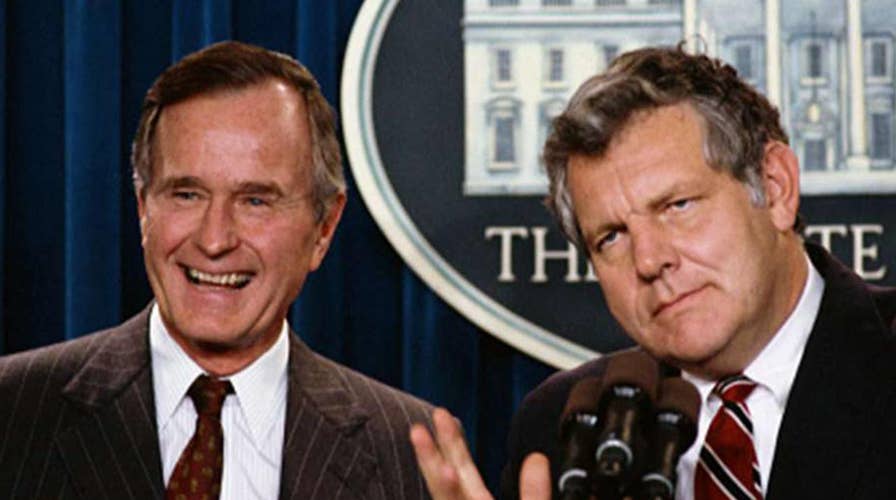Bill Bennett on George H.W. Bush and the war on drugs
Former President George H.W. Bush oversaw the greatest decline in American drug use in modern history, says former drug czar Bill Bennett.
We all knew the time would have to come soon, as naturally as his age and multiple previous close calls had transpired over the last couple of years. But President George H.W. Bush’s final and ultimate passage Friday at the age of 94 still comes as a punch, as if something of America passed with him as well.
Yes, he was from the “establishment” we hear so much about these days – but he was the best of the establishment. And the best of men.
President Bush famously called for a “kinder, gentler” nation, because he was kind and a gentleman. His other great traits were a sense of duty and a patriotism that simply cannot be taught. As Abraham Lincoln said of Henry Clay, it was simply something of and in him. He was born with it, and it imbued every part of his great character.
In personal interaction, President Bush was the best boss I ever had. I’m guessing those who had the privilege and honor of working for both Presidents Ronald Reagan and George H.W. Bush have the same sentiment.
The two were very different men, very different kinds of bosses, very different kinds of presidents. But those of us who worked for both know what I mean; there was a special personal touch that lived within George Herbert Walker Bush, and it touched everyone around him.
As a president, he is proof that history can change the view of a tenure. As with former British Prime Minister Winston Churchill, even after his great accomplishments, given the whims and fickleness of the public judgment, he served less time than he could or should have.
But George H.W. Bush never did anything for the temporary, and always maintained the long view. And that long view has been vindicated.
As journalist and author Jonathan Rauch has put it: “The contempt that intellectuals and activists feel for Bush reflects poorly on them, not him.”
Many crises were gathering and almost took place while President Bush was in the White House. They ranged from the savings and loan association crisis, to the fall of the Soviet Union, to the near-break up of NATO, to a revanchist China, to a still-unsettled series of juntas in Central America, to a roaring deficit.
A major crisis was the always problematic Middle East, especially Iraqi dictator Saddam Hussein’s invasion of Kuwait and near-invasion of Saudi Arabia.
President Bush took responsibility for dealing with all these crises and made no major mistakes. This was a massive accomplishment that should not be understated or underestimated. Mistakes were everywhere to be made, opportunities for each of those issues getting worse abounded. He controlled all those pressure valves.
There’s something else we must remember, though President Bush gets little credit for it, especially in our time: He hated the waste of human lives. When he named me the nation’s first drug czar, he gave me more support in that position and spent more time thinking on and talking about it than I ever could have ever imagined or asked for – and our work with the American people led to a greater than 50 percent reduction in substance abuse.
This is a story too little remembered. We could use that model of dedication and commitment right now, as we read of the deaths of over 70,000 Americans due to drugs.
Service, both public and private, could have defined President Bush, and so many other great virtues could have just as well. He was a man of great decency and was concerned for the personal well-being and families of others. He said yes to any meeting requested and returned every phone call I ever placed to him.
But when spending time with George H. W. Bush, one could not help pick up one overarching sense and theme of the man: a deep, abiding love of country – a quiet patriotism that stirred constantly within.
President Bush’s handwritten and typed notes were models of decorum and goodwill, always with an inquiry or wish for a family member or family event he knew about.
The president was also tremendously athletic – an avid jogger and tennis player and a fine line-drive hitter, to say nothing of skydiving in his retirement.
But when spending time with George H. W. Bush, one could not help pick up one overarching sense and theme of the man: a deep, abiding love of country – a quiet patriotism that stirred constantly within.
Nowhere did I see this more pronounced than in a 1990 trip to Portland, Oregon, with him. We were looking out a hotel window, predawn, when I had agreed to go jogging with him, and he saw protesters outside burning a pile of items, protesting any number of things. One thing they burned was the American flag.
President Bush turned to me and said: “I understand these young people and their protests – but what really gets to me is when they burn the American flag. Nothing gets me like that. Can anything be more disrespectful? Do they have any idea of what people have done to keep that flag held high?”
I remember thinking: If only the rest of the world could hear this man and the weight he puts in his deeply reflective moments like that – if only they could see his sense of America. He would be more loved.
But that was not the public President Bush; he was always more comfortable keeping his deepest feelings private. To my mind, he was a very emotional man who cared about more people and things than the public record or he would ever show.
History can show it now. Thank you, President Bush. Thank you, Boss. For everything.









































